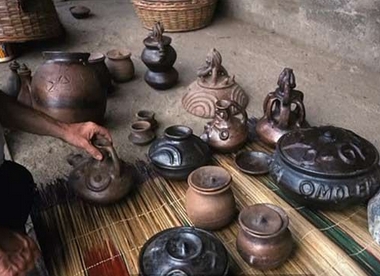
support@yorubalibrary.com
+2348073529208, 07038599574

Yoruba pottery and ceramics hold a significant place in the rich cultural heritage of the Yoruba people. These traditional crafts reflect the artistry and historical depth of the Yoruba civilization. This article explores the importance, techniques, and uses of Yoruba pottery and ceramics.
The Historical Significance of Yoruba Pottery
Pottery in Yoruba culture dates back centuries, serving as both functional items and artistic expressions. Historically, pottery was integral to daily life, used for cooking, storage, and rituals. The preservation of these practices highlights the deep connection between the Yoruba people and their traditions.
Techniques and Craftsmanship
Yoruba pottery is renowned for its craftsmanship, employing techniques passed down through generations. The process begins with sourcing high-quality clay, which is then meticulously prepared. The shaping of pottery is done using hand-building techniques, often without the aid of a potter's wheel. This manual process allows for unique and detailed designs.
Hand-Building Techniques
The Yoruba potters use coil, slab, and pinch methods to create various forms. These methods involve rolling clay into coils, flattening it into slabs, or pinching it into desired shapes. This hands-on approach ensures each piece is distinctive.
Firing and Finishing
Once shaped, the pottery is dried and then fired in open flames or traditional kilns. The firing process is crucial, as it strengthens the clay and enhances its durability. After firing, the pottery is often decorated with incised patterns or painted with natural pigments.
Cultural and Ritual Uses
Yoruba pottery is not merely utilitarian but also holds cultural and ritual significance. Various pottery forms are used in religious ceremonies, such as Ifa divination rituals.
Everyday Use
In everyday life, pottery items such as water pots, cooking pots, and storage jars are essential. These items are not only functional but also carry aesthetic value, reflecting the Yoruba appreciation for beauty in utility.
Contemporary Yoruba Pottery
While traditional methods and designs remain prominent, contemporary Yoruba pottery has also evolved. Modern potters incorporate new techniques and materials, blending tradition with innovation. This fusion has led to the creation of pottery that appeals to both local and international markets.
Modern Influence and Global Reach
The influence of modern design and global art trends has impacted Yoruba pottery, leading to more experimental and diverse creations. Yoruba potters now showcase their work in galleries and exhibitions worldwide, gaining recognition for their exceptional skills and creativity.
Preserving the Tradition
Efforts to preserve Yoruba pottery traditions are ongoing. Workshops, apprenticeships, and cultural programs are established to teach young generations the art of pottery. These initiatives ensure that the rich legacy of Yoruba ceramics continues to thrive.
Supporting Local Artisans
Supporting local Yoruba potters is crucial for the preservation of this cultural heritage. By purchasing handmade pottery, one contributes to the sustainability of the craft and the livelihood of the artisans.
Conclusion
Yoruba pottery and ceramics are a testament to the creativity and cultural depth of the Yoruba people. From historical significance to contemporary innovations, these crafts continue to inspire and captivate. Preserving and promoting Yoruba pottery is essential for maintaining this vibrant aspect of Yoruba heritage.

Learn about the Yoruba concept of Ìwà Pẹ̀lẹ́ (good…

Learn special praises for Divine Being and Creator…